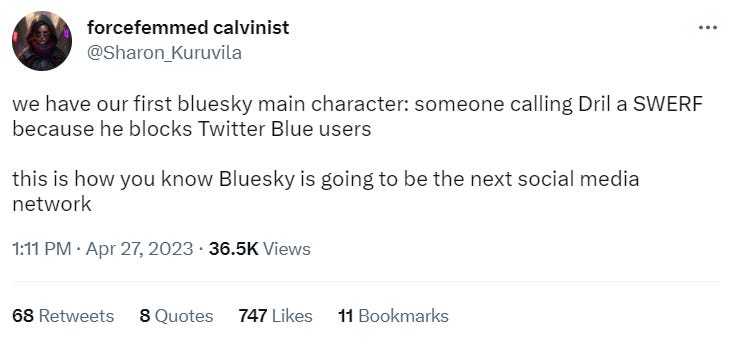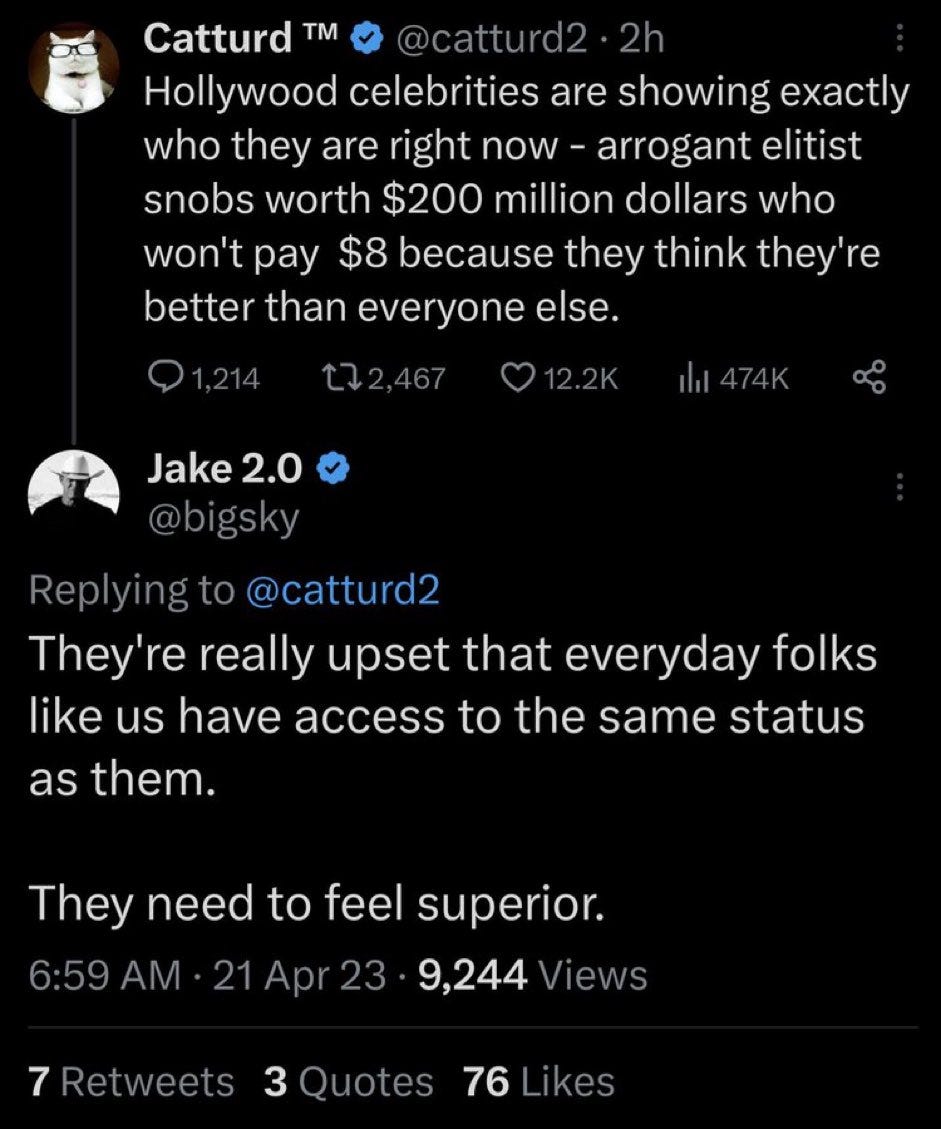Is Blue Sky the actual Twitter replacement?
Shitposting-As-A-Service as the new business model
We begin with two tweets:
Blue Sky is a new social media site that for all intents and purposes is a Twitter clone. Since Elon Musk’s purchase of Twitter, services like Blue Sky, Mastodon or Post have all been hailed as the ‘next Twitter’ - the place where we’ll all migrate as Twitter dies.
The tweets above are very funny, but it’s worth seriously analyzing them. They bring up concepts reminiscent of Eugene Wei’s famous Status as a Service essay (warning - 20K words long).
There are a series of core questions here:
Why do we use social media sites in the first place?
How are successful new social apps born, and how do the old ones die?
Which users actually create a site’s network effects?
Why are we posting in the first place?
Why are we even on social media? Wei’s answer is that these companies provide a mix of utility and status, and that ‘Status as a Service’ is the core feature of social media as a business. Beyond the basic utility (it’s useful to have a place to chat with friend, or to upload videos), human beings inherently seek out social capital. We’re hungry for status.
Where does status on social media come from? According to Wei, it’s ‘proof of work’ - being witty on Twitter, uploading fun dance video shorts on TikTok, looking effortlessly beautiful or cool on Instagram. Status is inherently a ranked game - not everyone can have high status. Proof of work helps differentiate us, as not everyone is able to be witty/dance well/look stunning. Scroll through Twitter or TikTok and you can practically taste the desperate reaching for status. Everybody wants to get likes, everybody wants to go viral, everybody wants to be recognized as one of the cool kids with a high follower count, lots of clout, and lots of attention.
Blue Sky’s challenge is that as of right now they have zero utility advantage on Twitter. In fact, they’re at a distinct utility disadvantage - they are missing basic, core features like blocks and DMs. The app is still in beta and not even open for public sign ups yet. Their bid to replace Twitter is a pure status play based on the idea that Twitter is now low status, and you can gain more status posting on Blue Sky.
A History of Collapse
Is ‘pure vibes’ enough to get people to switch from Twitter to another social network?
The answer is usually no. Network effects are real and they’re massive, and once a site has critical mass it’s extremely hard to get people to abandon it for a similar alternative. This is especially true if the status game you’re offering is essentially identical to your competitor - why switch when everyone’s already in one spot?
Most hot social media sites that last offer something new in the form of utility or functionality. Instagram was image focused and different. Tiktok focused solely on short form video. Etc.
There are only two large scale exoduses that have happened for similar social networks - Myspace for Facebook, and Digg for Reddit. The Digg exodus for Reddit was a unique event based around Digg’s site redesign that crippled the site’s functionality. Facebook had a mildly different utility than MySpace, but primarily succeeded because introduced a more potent status game than Myspace. It staggered its rollout from only Harvard, to only the Ivy League, then slowly through other colleges, creating a sense of exclusivity that drove demand. Facebook was somewhat differentiated from MySpace as a product, but ultimately it succeeded by being cooler, by producing a higher quality status game.
The question for Twitter, ultimately, is whether Elon’s changes will either
ruin the functionality so thoroughly that regular users leave the site en masse
ruin the status markers so completely that the site’s userbase abandons it purely based on the status vibes being higher at a Twitter clone like Blue Sky
How Blue Sky Wins (if they can)
I don’t think Twitter’s hit either of those markers… yet. They’re certainly doing their best to ruin functionality. Site downtime is up, replies are now dominated by terrible paid blue check accounts, Elon fired most of the teams responsible for keeping the site healthy and overall people seem to think the actual utility of Twitter is becoming worse. But for now it seems unlikely that the site’s functionality degrades so far that people have to leave. Which leaves us with the status game.
David Frum had an interesting post which I think summarizes the two ways to think about why we use social media sites:
Ben Collins links to a TechCrunch piece that says Bluesky’s best shot at success is to embrace shitposting. Shitposting as a Service, if you will. David’s complaint focuses on the utility of big accounts - he wants to be able to follow the LeBron James of the world, and he doesn’t care about shitposting psychopaths. He wants “reputable media organizations and experts”, the already famous and influential. But any theory of change that starts with attracting famous accounts gets it backwards. The famous accounts don’t create the atmosphere that engages new users. Highly engaged users create the atmosphere that attracts famous accounts. LeBron James or the CDC joining a social media site is a consequence of that site’s popularity, not a cause. If celebrities could cause a site to be popular, we’d be using the countless celebrity social media apps (which in real life all turned out to be dumpster fires).
Crucially, what matters to a new social app is status available to be gained. High status people joining your app is nice. But it almost doesn’t matter if high status people join, because they’re already high status and don’t provide a pathway to status for anyone else. What matters is an atmosphere where low status types have a real, clear opportunity to gain status fast.
AKA - a “new shitposting site”. What better place for a small or medium sized account to quickly gain attention and status?
I don’t know if Blue Sky will succeed. The odds are stacked against anyone trying to dethrone a massive incumbent with huge existing network effects. But if Blue Sky is going to succeed, it’s going to be from the bottom up like this. It’s not going to be celebrity driven and it’s not going to be feature driven. It’s going to be because the status available to a normal person on Blue Sky - via the typical games of shitposting, joking, and overall Twitter tomfoolery - is more attractive than the status to be gained on Twitter. Blue Sky needs flame wars, controversies, crazy and interesting posters to make those sort of status gains both legible and attractive.
What Elon & friends misunderstand about status
A final thought, depressingly centered around this post from ‘Catturd2’, one the biggest pro-Elon accounts on Twitter
Elon’s plans for Twitter involved taking away the status symbol blue checks from previously verified accounts, and then opening up the blue check to anyone who pays $8/month. This led to widespread mockery of the new blue checks, which of course makes people like catturd2 angry. He’s explicitly talking about having ‘the same status’ as verified accounts used to have.
The crux of the misunderstanding seems to be this:
Previously, the blue check was a strong signal of status because it was exclusive to certain people
Elon took away the blue checks from those people and gave them to an entirely different set of people
The new blue check people are now angry that they aren’t treated as having the same status as the previous group of blue checks.
Somehow, Elon and friends seem to have missed a crucial idea: it wasn’t the blue check that gave people status, it was the people that gave the blue check status. The blue check itself is meaningless, it’s the exclusivity that matters. Even when status is represented by images on a screen, you can’t just move the image and give catturd the same status as Ezra Klein. The angry Elon followers want access to status, but any club that would include them is by definition not a high status club, as Marx would say.
Status is like the parable of power from Game of Thrones. Like power, status resides where we believe it resides. It’s ephemeral, a mass delusion, a trick.
A final final thought: Jack Dorsey selling Twitter to a lunatic for $44 billion, watching him drive it into the ground, and then helping create a site that becomes the new Twitter is the funniest possible outcome and I hope it happens.







